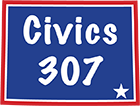The 2021 Joint Interim Committee on Corporations, Elections and Political Subdivisions held their first meeting in Cheyenne on June 7th and 8th. Preliminary consideration was given on the four Interim Topics: redistricting, elections, insurance and special districts. The Legislative Services Office has been tasked with drafting preliminary bills for review at the next scheduled meeting.
The topic of Elections sparked the greatest interest including a 40 minute discussion on a Pledge sent out to all Republican legislators from a freshman legislator. He was pushing for commitments in support of a State GOP backed bill to add Primary Run Off Elections where the top vote getter does not receive greater than 50% of the votes cast. The bill did not move forward in the 2021 Session. The large slate of candidates in the 2018 Republican Gubernatorial Primary and the already crowded field for the 2022 US Congress Republican Primary is clearly identified as the impetus for making changes effective for the 2022 election season.
Redistricting in constitutionally mandated for completion in the 2022 Budget Session. Upon passage, the results are sent to the Counties to revise Precinct boundaries as necessary to match the resulting districts. As the County Clerks, who are responsible for conducting elections explained, they will be under considerable time pressure to have these completed in time for the regularly scheduled Primary Election in August 2022. There simply is no way to add in a third election while meeting the redistricting requirements. Not only does it pull the Primary Election in by 11 weeks (first Tuesday in June) so that run offs can be held in August, the cost just to the counties is an additional $1.1M that they do not have. There are also costs to the Secretary of State office bringing the total to $1.5M. And some 41 statutes have to be altered to accommodate the change.
The push for the Run Off Elections resulted in the Joint Corporations Committee being tasked with the Interim Topic to consider Elections. At the end of Day One, LSO was assigned with drafting two bills for consideration and debate at the next Interim Committee Meeting which has not yet been scheduled. Of the three alternatives, the bill drafts will be for Ranked Choice Voting (RCV) also called instant run off and for a Top Two Open Primary (aka Jungle Primary). The first retains the major party nominating Primary Election as currently defined in statute. The second changes the Primary Election from nominating to reducing the field.
As was pointed out by the freshman legislator, because of the domination of the Republican Party, the overall winners of the Republican Primary races become de facto General Election winners. While he used that as a reason to tighten up the Primary Elections and hold a run off, it makes a stronger argument for the Top Two Open Primary option to ensure the entire electorate is involved in final determination. Civics307 testified on the existing voter participation and primary results impact from the 2020 primary for all legislative races (75) and then compared this to the General Ballot under the two options.
Testimony on Primary Elections
Note that on the last page of the presentation, there is a graphic depicting “crossover voting” in the 2020 Primary Election. This is the second bill topic that the Pledge covered. The data for the analysis came from Wyoming Secretary of State Elections Office official data files which is presented down to the individual Voter ID. The files included the 2020 Primary Voter History File, the 2018 and 2020 General Voter History file, the January 2020 Voter Registration File and the January 2021 Voter Registration File. The voter history file contains the registration Party at that election. Every single voter casting a ballot in the 2020 Primary was compared to their Party affiliation in the preceding January and 2018 General. Similarly, these voter IDs were compared to their affiliation in the 2020 General and 2021 January. Any differences were identified as changes in affiliation.
The low percentages of “crossover voting” between the two major parties is reflected all the way down to precinct levels. While it clearly occurs, it also has no impact on election outcomes
